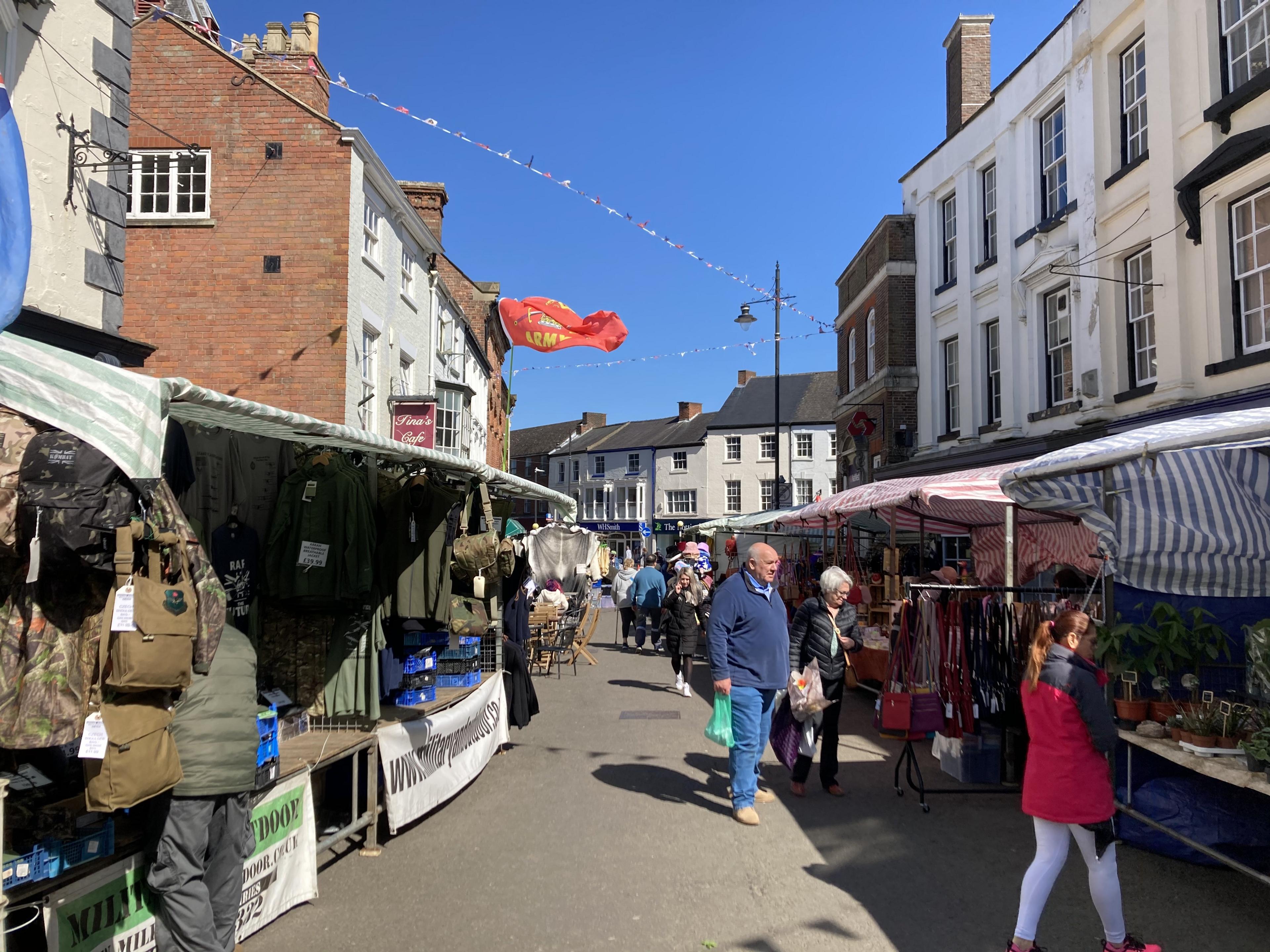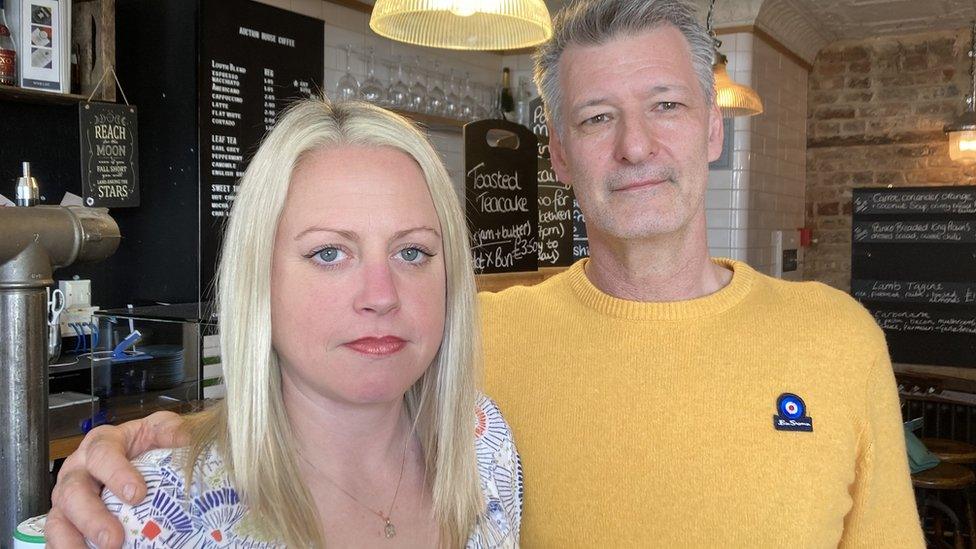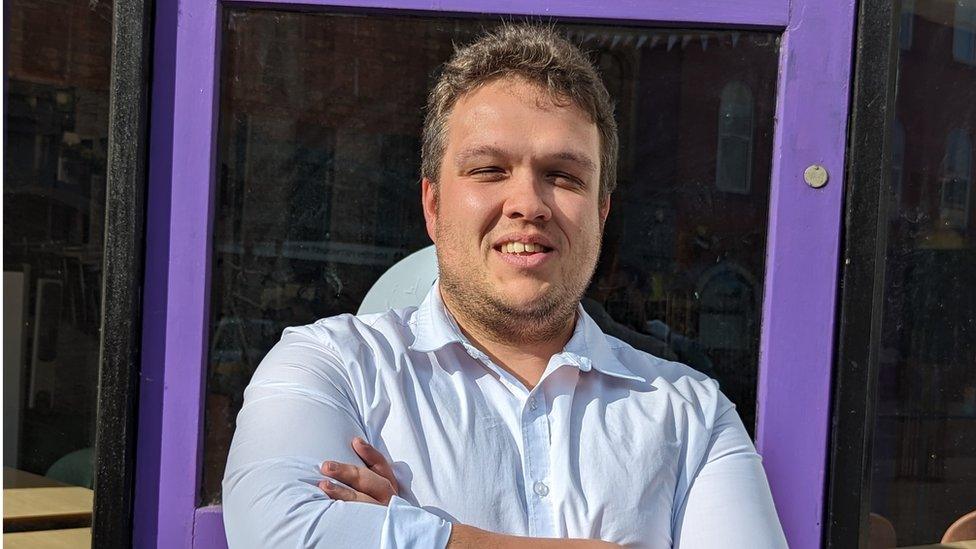Small firm closures behind rise in liquidations, experts say
- Published

Louth, in Lincolnshire, has lost two popular high street businesses this year
Company closures increased by five times in parts of the UK last year compared to the year before the pandemic, BBC analysis has found.
Experts said places with a high number of independent firms saw the largest proportional rises in liquidations in 2022 compared to 2019.
Retail, hospitality and construction were the hardest hit industries.
The government said it had provided around £400bn of support to businesses since the pandemic.
In January, government figures, external showed around 22,000 companies suffered insolvency last year in England and Wales - more than any time since 2009.
To obtain a regional picture, the BBC looked at creditors' voluntary liquidation notices posted in The Gazette, external, the official paper of record for public notices.
'Our most difficult year'


Rachel and Dale Wright had to close their popular restaurant
Customers of Dale and Rachel Wright's popular restaurant in Louth thought the couple were sitting on a goldmine.
The restaurant, which turned over more than £200,000 a year, was a popular 27-table eatery in the East Lincolnshire market town.
But the Wrights were forced to close when their energy bills tripled from £750 a month to more than £2,800.
"We had a customer come in and say, you do amazing food, cocktails, everyone is so friendly, it's the best place in Louth - it must be a goldmine," said Dale.
"And we looked at each other and laughed and said 'not really' because whatever comes in just goes out the back door."
The couple received a £10,000 business support grant through their local authority in 2020, while also using the furlough scheme and a bounce back loan to help them through the period following the pandemic.
But the Wrights, who have more than 40 years of hospitality experience between them, said 2022 was the most difficult year they had experienced. As well as energy costs, their stock outgoings soared.
"Anything that was flour-related doubled in price; oil doubled in price," Dale said. "I could buy a 20-litre tub of sunflower oil for £18 two years ago. Now it is £41."
'A slow chokehold'


Ryan Waite ran a busy café in Bolton before spiralling costs forced him to close
Ryan Waite opened a branch of comic book and board game café The Geek Retreat in Bolton in early 2022, ploughing savings and a start-up loan into the venture.
"I'm mad for comic books," the 30-year-old said. "I used to say if I won the lottery I would buy a comic book store even if I lost money."
Ryan, who was working as a quantity surveyor beforehand, took up a lease in Bolton's Market Place Shopping Centre and regularly filled the place with customers.
But in August, the cost of some of his stock, such as playing cards and board games, went up by a third. It hit his takings hard - and in October 2022, he was forced to close, returning to his job as a quantity surveyor so he could pay back the business loans he received.
"We had Saturday nights rammed, but the main issue was the cost of it all compared to the money coming in," he said.
"It was a slow chokehold over nine months where my value was just a little bit too low to pay for the stock."
What do the figures show?
More than eight out of ten local authority areas saw the number of liquidations rise last year compared to the year before the pandemic.
Havering, on the outskirts of east London, went from seeing 40 voluntary liquidations in 2019 to 205 last year.
Other large rises occurred in Southend-on-Sea, Essex, where the number of failing firms rose from 51 to 240.
Both Havering and Southend suffered from a collapse in smaller construction firms, with a third of all losses falling in that category.
Other areas have been affected by the changing nature of the high street.
Derby, in the east Midlands, saw the number of liquidations more than treble from 33 to 108.
While Bolton, in Lancashire, saw the number rise from 224 to 501. Half of those losses were felt on the high street, losing 124 hospitality venues in 2022 alone.
The analysis focussed on creditors voluntary liquidations, the most common way for firms to be shut down. It looked at where a company was registered, which in some cases may differ from the location it operated.
Your device may not support this visualisation
What's behind the rise?
The Federation of Small Businesses' Michael Weedon said the rise was down to a "perfect storm" where firms recovering from the pandemic and paying off Covid-19 bounce-back loans were hit by surging costs because of the war in Ukraine.
"We've seen large rises in insolvencies, particularly in places where there are more independent businesses," he said.
"Large cities tend to be the home of bigger businesses, so the outskirts of big cities and smaller places, where there are more independents, are seeing the effect of these liquidations."
Mr Weedon said town centre footfall had not returned to pre-pandemic levels. Independent traders also did not have the same reserves as big high street names, which would enable them to cope with the leap in stock and energy costs.
He called on the government to reinstate the energy bill discounts it was providing to businesses prior to April and to raise the threshold by which smaller firms have to pay business rates.
Your device may not support this visualisation
Zombie companies
Julie Palmer, a managing partner for the insolvency experts Begbies Traynor, said the construction industry had been hit hard by the the changing nature of town centres.
Smaller firms bore the brunt of those closures, Mrs Palmer said, as they would find it harder to manage rising costs.
However, Mrs Palmer said insolvencies were just one measure of an economy.
Since the financial crisis of 2008, she said the UK had been carrying many so-called "zombie companies" propped up by favourable interest rates.
"It sounds a little bit counterintuitive, but sometimes a rise in insolvency can be a positive factor," she said.
"Many of those employees will get their jobs recirculated in better financed businesses that are better run and can make better use of the working capital."
Business minister Kevin Hollinrake recently wrote to the energy watchdog Ofgem asking it to ensure energy suppliers were lenient towards businesses struggling to pay energy contracts.
A government spokeswoman said action had been taken to protect small and medium-sized businesses by freezing fuel duty and reversing a planned rise in National Insurance.
"We have already provided around £400bn of direct support to businesses, including business grants, coronavirus loan schemes, the Coronavirus Job Retention Scheme, plus income tax payment deferral," said the spokeswoman.
"This is alongside a new arbitration scheme to help resolve pandemic-related rent debt."
The spokeswoman said total company insolvencies in England and Wales were 29% higher than in 2019. In Scotland, the number of insolvencies was 3% higher in 2022 than 2019, while in Northern Ireland it was 38% lower.
Compulsory liquidations and administrations were lower than in 2019, the spokesman added.